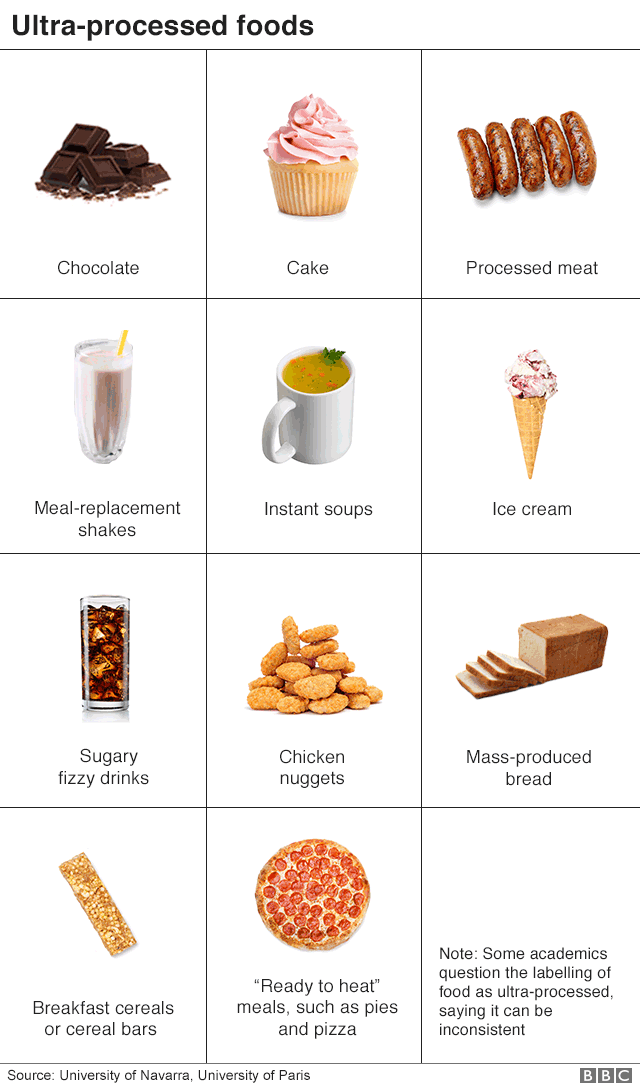The Message on Steroids, the Response Disinterest
"The public should avoid these foods as much as they can."
"We need to go back to more basic diets."
MathildeTouvier, French NutriSanté study, University of Paris
"Ultra-processed foods already make up more than half of the total dietary energy consumed in high-income countries such as [the U.S.], Canada and the U.K."
"In the case of Spain consumption of ultra-processed food almost tripled between 1990 and 2010."
"Ultra-processed foods are made predominantly or entirely from industrial substances and contain little or no whole foods. They are ready to heat, drink, or eat."
Maira Bes-Rastrolio, lead author, Spanish study, University of Navarra
"[Policy makers] should shift their priorities away from food reformulation -- which risks positioning ultra-processed food as a solution to dietary problems -- towards a greater emphasis on promoting the availability, affordability, and accessibility of unprocessed or minimally processed foods."
Editorial, Australian researchers
 |
| A shopper in the ready meal aisle of a supermarket. Photograph: Alamy |
"Governments must do more to comprehensively reduce the availability, affordability, and appeal of processed foods high in fats, sugars and salt."They're the food stuff of an ultra-busy world, too preoccupied with other things to waste time preparing meals out of whole foods such as fresh fruits and vegetables, unprocessed meat, fish, eggs and other products that have not been transformed as far from their natural state as can be imagined. But they're inexpensive and they're convenient. Quick-and-easy is the formula. And it seems to work for a large segment of the population.
"It is critical to pursue further research on the connection between food and health. There is a lot we do know but also a lot we have yet to learn. We need more and more studies to build up a bigger picture."
Prof Corinna Hawkes, director of food policy at City University London
We've been hearing from nutritionists for years that consumption of processed foods can be injurious to one's health and longevity. A growing body of scientific evidence points out how and why ultra-processed foods are harmful to human health. And yet another two such studies have been published just weeks ago in The British Medical Journal. One by a French team which associated ultra-processed diets with a greater risk of cardiovascular disease, and a Spanish study that found an increased premature death risk associated with the steady consumption of ultra-processed foods.
The health and lifestyle data of over 105,000 people analyzed in the French study concluded that those who ate the most ultra-processed food were at the highest risk of cardiovascular disease; heart attack and stroke. Each incremental ten percent increase correlated with a 12 percent rise in disease risk. Highlighted were packaged soups, TV dinners, chicken nuggets, fries, hotdogs, ice cream, sweetened breakfast cereals, candy and soft drinks.
That's just for starters, among the ubiquitous foods found everywhere that fall into the category of ultra-processed foods. They are called food but they are as far from whole foods as processing can possibly produce. And for most people who consume these foods they are simply accepted as their mainstay diet; quick, easy, convenient, available and cheap. What they all have in common, aside from the health risk associated with regularly consuming them, is their long ingredient list and their modified forms.
 |
| While the term ultra-processed food may be new, the health advice will be very familiar: adopt a Mediterranean-style diet. Getty Images |
The same food in basic form, unmodified, has no list of ingredients. But of course, as whole foods they require preparation if they're protein-based. The Spanish study led by professor of preventive medicine and public health at the Universidad de Navarra, Maira Bes-Rastrollo, examined food consumption patterns of an estimated 20,000 university graduates, aged 20 to 91. After factoring for smoking, age, body mass index and gender the heaviest consumers of ultra-processed foods (four servings daily) were found to be 62 percent likelier to die prematurely as opposed to the lightest (fewer than two servings daily).
Furthermore, mortality risk rose by 18 percent accounting for each additional daily eaten portion. How to recognize ultra-processed foods? A large list of industrial ingredients, with few or no whole foods, the product in ready-to-eat form. These are faux foods designed to taste palatable, and the advertising accompanying them meant to be persuasive, alluringly packaged. They are legion. And they are so ubiquitous their presence is taken for granted as completely normal fare.
That they have taken the place in most peoples' daily diets of the whole foods that are natural, nutritious and appealing, but require preparation and forethought, speaks volumes of the popularity of an alternative requiring no thought and no preparation and a lack of curiosity on the part of the consumer about what they're really eating and how it fails to benefit their health and longevity needs while fitting the bill for cheap availability; most of all, no fuss, no mess.

Labels: Diet, Health, Heart Health, Longevity, Processed Foods, Research

0 Comments:
Post a Comment
<< Home